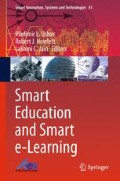Abstract
Nowadays, Information and Communication Technologies (ICT) make great strides in computer assisted education. They enable development of new, Self-Directed Learning (SDL) driven, models of teaching and learning, and among them, Flip Teaching (FT) seems to be the most promising one. The flipped classroom is based on e-materials, then, the associated assessments have to be fully based on e-tests, FT-Computer-Assisted Assessment (CAA) program. Design of such program is the main motivation of the described research. Matching of this program to FT characteristics, taking into account both specific structure of the learning content and students behavior is the main objective. After a short introduction to FT, the e-test organization in the flipped classroom is briefly discussed. Then, Electric Circuit Analysis course case study is presented: organization of Moodle-quizzes based assessment program, taking into account common students behavior, their good and bad habits, is shown, conclusions are drawn and some guidelines are given.
Access this chapter
Tax calculation will be finalised at checkout
Purchases are for personal use only
References
Aldrich, S.: Learning through technology: from institutional course delivery to collaborative knowledge creation. In: Proceedings of the 12th IASTED International Conference on Computers and Advanced Technology in Education (CATE), US Virgin Islands, Keynote Address (2009)
Grow, G.: Teaching learners to be self-directed. Adult Educ. Q. 41(3), 125–149 (1991/1996)
Abdullah, M.H.: Self-directed learning. Educational Resource Information Center (2002). http://www.ericdigests.org/2002–3/self.htm
Walsh, K.: Gathering evidence that flipping the classroom can enhance learning outcomes. EmergingEdTech (2013). http://www.emergingedtech.com/2013/03
Rutkowski, J.: Flipped classroom—from experiment to practice. In: Proceedings of 1st International KES Conference on Smart Technology Based Education and Training, Chania, Greece (2014)
Reja, U., Lozar, K., Hlebec, V., Vehovar, V.: Open-ended vs. close-ended questions in web questionnaires. Developments in Applied Statistics. Metodoloski zvezki, 19, Ljubljana: FDV, pp. 159–177 (2003). http://mrvar.fdv.uni-lj.si/pub/mz/mz19/reja.pdf
Starkings, S.: How to asses large groups with the minimal amount of resources but preserving quality. In: Proceedings International Statistical Institute—ISI 52nd session, Helsinki, Finland (1999). http://www.stat.fi/isi99/proceedings.html
Fielding, A., Bingham, E.: Tools for Computer-Aided Assessment, Learning and Teaching in Action, vol. 2, Issue 1. Learning and Teaching Unit of Manchester Metropolitan University (2003). http://www.celt.mmu.ac.uk/ltia/issue4/fieldingbingham.shtml
Chalmers, D., McAusland, D.M.: Computer-assisted assessment. In Houston, J., Whigham, D. (eds.) Handbook for Economics Lecturers. Glasgow Caledonian University, Glasgow (2002)
Sim, G., Holifield, P., Brown, M.: Implementation of computer assisted assessment: lessons from the literature. ALT-J, Res. Learn. Technol. 12(3), 215–229 (2004)
Rutkowski, J.: Development and evaluation of computer assisted exam—Circuit Theory example. In: Proceedings of 9th IASTED International Conference on Computers and Advanced Technology in Education (CATE), Lima, Peru, pp. 333–338 (2006)
Moodle 2.7 Documentation: https://docs.moodle.org/27/en/Main_page
Rodanski, B.S.: Web-based tutorials and assessment in technical subjects. In: Proceedings of the International Conference on Signals and Electronic Systems (ICSES), Lodz, pp. 141–144 (2006)
Rutkowski J., Moscinska, K., Jantos, P.: Web-based assessment and examination system—from experiment to practice. In: Proceedings of the 10th IASTED International Conference on Computers and Advanced Technology in Education (CATE), Beijing, China, pp. 206–211 (2007)
Moscinska, K., Rutkowski, J.: Introduction of summative and formative web-based assessment to the Circuit Theory course. In: Proceedings of the International Conference Web-Based Education (WBE) 2007, Chamonix, pp. 395–400
Rutkowski, J., Moscinska, K., Grzechca, D.: Students’ attitude to formative web-based assessment. In: Proceedings of the IASTED International Conference on Web Based Education (WBE), Innsbruck, pp. 139–144 (2008)
Author information
Authors and Affiliations
Corresponding author
Editor information
Editors and Affiliations
Rights and permissions
Copyright information
© 2015 Springer International Publishing Switzerland
About this paper
Cite this paper
Rutkowski, J. (2015). Moodle-Based Computer-Assisted Assessment in Flipped Classroom. In: L. Uskov, V., Howlett, R., Jain, L. (eds) Smart Education and Smart e-Learning. Smart Innovation, Systems and Technologies, vol 41. Springer, Cham. https://doi.org/10.1007/978-3-319-19875-0_4
Download citation
DOI: https://doi.org/10.1007/978-3-319-19875-0_4
Published:
Publisher Name: Springer, Cham
Print ISBN: 978-3-319-19874-3
Online ISBN: 978-3-319-19875-0
eBook Packages: EngineeringEngineering (R0)

